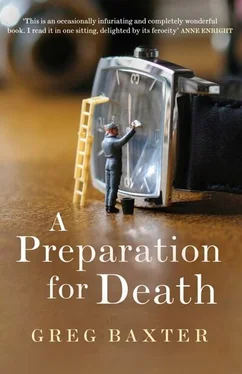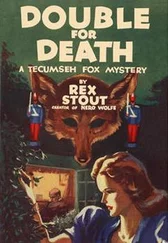Michi is thirty-eight, and now that his party is in the ruling coalition he has hope that things will change for the better. I wonder at his determinedness — politically I have none at all. In another bar, a little while later, over a plate of chicken schnitzel, I told him that I never had my own political position on anything, except contempt. He said that is a type of politics. I disagree, but I knew what he meant. I did not have the German to keep up with him. And anyway, I knew that arguing would prove his point. I proved mine, or tried to, by telling him he was right.
Walter does everything with a cigarette in his mouth, it seems, and a cup of coffee or tea near by, and he is usually a little drunk and stoned before noon, though he conceals his morning drinking. He’s off work now, because of his neck. This morning we watched the downhill skiing. Austria finished second and third, and Switzerland was victorious. Oh well, he said, the slalom is tomorrow.
He proposed a Spaziergang — a hike to get some fresh air and exercise, and of course to get a view of the city from high up. This is a hike we seem to make every time I’m in Vienna, except that this time much of the trail to the top was ice, so after a chest-incinerating ascent through the wealthy streets of Ober St Veit we had to claw our way, branch by branch, up the steep slopes through the forest. Since the woods are not evergreen, you could see limitlessly through them, thin brown trunks and leafless branches, and the sunlight blazed crisply off the icy earth. When we got to the top, Walter smoked a cigarette and we tried to identify different churches in the distance. The air was almost white. In the summer, Walter and his parents rent a little bit of land on the hillside to grow vegetables. Many small plots are for rent. He tells me, as we walk beside the spot, which was all ice and sludge, that on nice days in June, July and August, there are dozens of people digging around and tending and gathering. Walter says he wants to move to the countryside and do nothing but work on his garden, to have his elbows in the earth. I ask him if he’d miss anything in the city — the sauna, perhaps, though he can live without sex for long stretches, and concerts, and the shrimp dish at Umar Fisch.
I cooked enchiladas that afternoon for Walter and his friend Martin, a hairdresser. Martin had been out until six a.m. the previous night, and had two hours of sleep before going to work. He looked as though vampires had been feasting on him for a week. He ate with his face an inch away from the plate. After his last bite, he stood up, walked to the bedroom, and did not return. Walter was heading into town with his friend Carolin for a piano concert in the Musikverein: Beethoven, Scriabin, Prokofiev, Chopin — and Carolin was supposedly friends with the pianist, and everyone was heading to a restaurant in the Eighth for a post-concert party. Walter wore a very conservative black suit, white shirt, and red tie. He said he needed the red because all the colour had seeped out of his face.
I took a nap, and when I woke up, Martin was sitting on the couch across from me, watching a blank television screen. I poured myself a glass of wine — I didn’t want to show up to the party cold sober — and Martin gave me a haircut. He clipped it without a guard, and afterward I was shocked at the sight of myself. It had never been so short. It was, effectively, gone. Do I look like a neo-Nazi? I asked. Lazily he said anything is better than being bald and letting your hair grow — he is bald also. Then he went back to sleep. After an hour of staring at myself in the mirror, I grew a little more accustomed to the sight.
I took the U4 to Pilgramgasse and the 13A bus to Laudongasse — if I had stepped off the bus and walked ten feet further, I’d have seen the restaurant that Onka owns. But now that Onka seemed not to want to see me, for whatever reason, I didn’t want to do damage to my memory of the place, or of her. I stepped into Dionysus, the restaurant where the party was being held, and I expected a great deal of commotion — the pianist surrounded by young women, the owner delivering bottles of champagne to every table, scandal, quarrels. Perhaps even some singalong tunes played on an old piano. If I were a concert pianist who could sell out the Musikverein, I’d have expected nothing less. Instead, one half of the restaurant was empty. Walter was at the bar by himself smoking a cigarette, because he and Carolin were at a non-smoking table. Seeing Walter smoking by himself in a conservative suit in an empty restaurant on a Saturday night made me very unhappy. The pianist was not there, he said. Maybe he would come later. Carolin and I said hello — we had met briefly the previous March — and we sat down with a handful of dreadfully boring people who refused to talk to us. I asked them if they had liked the concert and they said it was nice, and then went back to each other. I looked at Walter and he shrugged. I have no idea who they are, he said. Carolin explained, but I wasn’t listening. I was trying to get the attention of a blonde waitress with a beautifully long, crooked nose, so I could start drinking.
By midnight Walter was yawning, and we decided to get our coats and have a drink somewhere else. I put on my coat and stood at the bar and smoked a cigarette with Walter, while Carolin and the owner — a Kurd — chatted about the smoking ban. He said it was a good idea, since he didn’t smoke — except that he was chain-smoking. Nobody made anything of this. We were on our way out when Carolin’s eyes opened very widely and she shouted, Maestro! I turned to see the pianist arrive. A corner of the restaurant stood up to applaud and shriek praise. I was closest to the door, and inexplicably he stuck his hand out at me. I shook it. Servus , Carolin, he said. Carolin tried to get to him, perhaps to kiss his hands, but he was already moving to the table that was applauding him.
I woke late on the Sunday, and Walter called Lucy McEvil to see if we could have some coffee at Villa Valium. She said to come by anytime — on weekends she was performing on stage in a very camp version of Lady Windermere’s Fan , but during the week she mainly wrote and composed and worked in her garden.
We walked. It takes about thirty minutes to hike up to her place in Baumgarten, in Hütteldorf. She was outside in the garden when we arrived, holding a little spade and an axe. Lucy’s real name is Martin, though nobody but the bank refers to her as Martin. She is very tall with long arms, long legs and long fingers. She moves very slowly and sweepingly. She is not a transvestite — she is an entertainer. Outside of entertaining, she dresses like a man. But everyone still calls her Lucy, and still refers to her as she.
I had forgotten so many details about the place — that, from the outside, it looks like a disused garden shed, that it has no hot water, no heat at all, and that Lucy bathes herself in the garden with a hose, even in winter. She heats the place with a wood-burning stove, and cooks by moving pots and pans on and off the heat. The toilet is next to the sink, and there is nothing but a little saloon-style swinging door separating you from anyone else in the house. The ground floor is no more than ten feet by fifteen feet, and there’s a bedroom upstairs with a small balcony, from which, at night, when you can see the lights, Vienna blinks like a vast metropolis, even though it is not one. She has decorated it, inside, with an impressive collection of kitsch and costume jewellery and pictures of herself. And yet, with all this kitsch and decay, there is an atmosphere of delicacy and elegance about the place — though perhaps this comes only from her. In the basement, there is a cold room full of hundreds of bottles of vodka, which she can drink like lemonade.
Читать дальше












